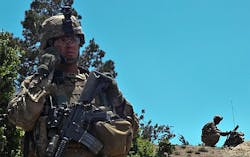DARPA to brief industry 1 April on network security to operate through bad wireless nodes
ARLINGTON, Va. 19 March 2013. Military communications experts at the U.S. Defense Advanced Research Projects Agency (DARPA) in Arlington, Va., will brief industry April 1 on a program to help voice and data wireless networks continue to function if the network has bad nodes.
DARPA will host industry-day briefings for the Wireless Network Defense program from 9 a.m. to noon on 1 April 2013 at the Executive Conference Center (ECC) at 4075 Wilson Blvd., Suite 350, in Arlington, Va. Briefings on the network-security program will include questions and answers from those attending, and providing teaming opportunities.
In areas lacking trustworthy communications infrastructure, military forces rely on wireless networks with nodes that coordinate among themselves to manage resources, such as spectrum and power, and determine the best configurations to enable sharing of information, DARPA officials explain.
Typically these networks trust all information they share about the security and status of each node and the network as a whole. As a result, inaccurate information can bring the network down quickly. The DARPA Wireless Network Defense program aims to develop new protocols that enable military wireless networks to remain operational despite inadvertent misconfigurations or malicious compromise of individual nodes.
“Current security efforts focus on individual radios or nodes, rather than the network, so a single misconfigured or compromised radio could debilitate an entire network,” says Wayne Phoel, manager of the Wireless Network Defense program.
“We need to change how we control wireless networks by developing a network-based solution for current and future systems that acknowledges there will be bad nodes and enables the network to operate around them,” Phoel says.
| Related stories -- Northrop Grumman acquires M5 Network Security -- Electrical grid attacked, cybersecurity more important now than ever -- Secure cell phone technology gets ready for deployment. |
The program will develop protocols that determine the viability and trustworthiness of neighboring nodes and adapt the network automatically to operate through problems.
“Credit card companies use various indicators for trying to determine if someone has stolen your credit card and is posing as you,” Phoel says. “Unexpected purchase locations, amounts and other factors could raise an alert.”
Register for the industry briefings no later than 26 March 2013 by email to [email protected]. Put PROPOSERS' DAY REGISTRATION in the subject line, and include full name; organization; email address; postal address; and telephone number.
One-on-one meetings with the program manager will be available starting at 1 p.m. on 1 April. Request a meeting by email to [email protected] with ONE-ON-ONE MEETING in the subject line.
Email questions or concerns to DARPA at [email protected]. More information is online at http://go.usa.gov/2nuR .
